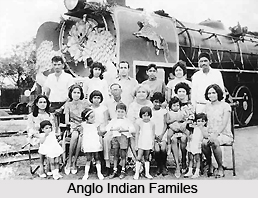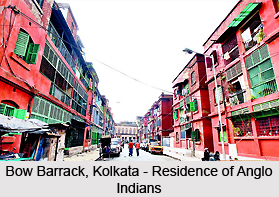 Anglo-Indians refer to those European Indians who are descendants of British men and women of lower-caste women from Hindu or Muslim community. During the nineteenth century the offspring of these unions were rejected both by the British and Indian societies but later on with the progress of time the group of Anglo-Indians sought marriage partners among others of the same caste. With the flow of time the group of Anglo-Indians acquired a special niche for themselves in the postal, railroad and custom services. Several factors contributed towards the development of a strong sense of union among the Anglo-Indian community. They are regarded as a minority community before the independence of the Indian subcontinent but in the recent times, more live, outside than within.
Anglo-Indians refer to those European Indians who are descendants of British men and women of lower-caste women from Hindu or Muslim community. During the nineteenth century the offspring of these unions were rejected both by the British and Indian societies but later on with the progress of time the group of Anglo-Indians sought marriage partners among others of the same caste. With the flow of time the group of Anglo-Indians acquired a special niche for themselves in the postal, railroad and custom services. Several factors contributed towards the development of a strong sense of union among the Anglo-Indian community. They are regarded as a minority community before the independence of the Indian subcontinent but in the recent times, more live, outside than within.
In fact during the independence movement these Anglo-Indians were assumed to identify with the British reign and therefore incurred the distrust and hostility of the Indian nationalists. They also felt insecured in a nation where they had to put a premium on participation in the freedom movement in order to acquire important government positions. Many of them left India in 1947 to settle down in other Commonwealth of Nations like Australia and Canada but some of them returned back after unsuccessful attempts to find a place in the alien societies.
 Many of them however chose to stay back making whatever adjustment necessary to live a comfortable life in India. The Anglo-Indians especially occupied the urban areas to make a comfortable living. Few of them had attained high levels of education, possessed great wealth or achieved more than subordinate government positions. Towards the end of the nineteenth century Anglo-Indians became scattered out mostly in the larger cities of the nation.
Many of them however chose to stay back making whatever adjustment necessary to live a comfortable life in India. The Anglo-Indians especially occupied the urban areas to make a comfortable living. Few of them had attained high levels of education, possessed great wealth or achieved more than subordinate government positions. Towards the end of the nineteenth century Anglo-Indians became scattered out mostly in the larger cities of the nation.
The rights of communities guaranteed by the Constitution permitted the Anglo-Indians to maintain their own schools and to use English as the medium of instruction. The Government stipulates that a certain percentage of the student body should come from the other communities of India to ensure and encourage the integration of the community into the larger society. In terms of employment of Anglo-Indians in Government posts there is not evident official discrimination. There are some in fact who have scaled great heights in their career; some hold high designations in the military while there are few who are in the judicial services. Most of the Anglo-Indians are of the view that gaining employment in schools is very easy due to their fluency in English Language. To help this minority group in India many charities have been set up in foreign nations. The community of Anglo-Indians is the only one which has its representatives nominated to Lok Sabha in the parliament of India. The Indian states of Tamil Nadu, Andhra Pradesh, Kerala and Bihar also have a nominated member each in their respective State Legislatures. The Anglo-Indian community will however remain distinct as long as its members marry only the alike from the same community and its European descent continues to be noted.




















